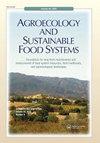Regenerative rangeland management farmers in Spain: enthusiastic among a great diversity in farming conditions
IF 2.6
3区 农林科学
Q1 AGRICULTURE, MULTIDISCIPLINARY
引用次数: 0
Abstract
ABSTRACT Regenerative Rangeland Management (RRM) is emerging as one of the most promising approaches to achieving sustainability of animal production at economic, social and environmental levels. The current bottleneck in RRM is a slow adoption rate, as the farmers’ views are still poorly studied and considered. We conducted individual surveys with 33 Spanish RRM farmers that collected multiple variables regarding general characteristics of farms, productive parameters, rangeland management and opinions around perceptions. We performed associative tests in order to detect the most important drivers of economic profitability and personal satisfaction. Among a wide diversity of farms, we found no features or management types associated with higher profitability, but rather a link to the level of intensification and degree of experience. About 93% of the farmers were mostly satisfied with RRM, even though they face difficulties – highlighting bureaucratic ones. To overcome such hurdles, we encourage improving the dialogue between farmers, researchers and institutions. This is the first state-level study on RRM in Spain, and one of the first analyses collecting farmers’ perceptions on this topic. Graphical abstract西班牙牧场再生管理农民:对农业条件的多样性充满热情
摘要再生牧场管理(RRM)正在成为在经济、社会和环境层面实现动物生产可持续性的最有前途的方法之一。目前RRM的瓶颈是采用率低,因为农民的观点仍然没有得到充分的研究和考虑。我们对33名西班牙RRM农民进行了个人调查,收集了关于农场总体特征、生产参数、牧场管理和看法的多个变量。我们进行了联想测试,以检测经济盈利能力和个人满意度的最重要驱动因素。在各种各样的农场中,我们没有发现与更高的盈利能力相关的特征或管理类型,而是与集约化水平和经验程度有关。大约93%的农民大多对RRM感到满意,尽管他们面临着困难——这突出了官僚主义的困难。为了克服这些障碍,我们鼓励改善农民、研究人员和机构之间的对话。这是西班牙第一个关于RRM的州级研究,也是第一个收集农民对该主题看法的分析之一。图形摘要
本文章由计算机程序翻译,如有差异,请以英文原文为准。
求助全文
约1分钟内获得全文
求助全文
来源期刊

Agroecology and Sustainable Food Systems
AGRICULTURE, MULTIDISCIPLINARY-GREEN & SUSTAINABLE SCIENCE & TECHNOLOGY
CiteScore
4.80
自引率
7.70%
发文量
73
期刊介绍:
Agroecology and Sustainable Food Systems is devoted to the rapidly emerging fields of agroecology and food system sustainability. By linking scientific inquiry and productive practice with transformative social action, agroecology provides a foundation for developing the alternative food systems of the future. The journal focuses on the changes that need to occur in the design and management of our food systems in order to balance natural resource use and environmental protection with the needs of production, economic viability, food security, and the social well-being of all people.
Agroecology and Sustainable Food Systems examines our current food systems from production to consumption, and the urgent need to transition to long-term sustainability. The journal promotes the study and application of agroecology for developing alternatives to the complex problems of resource depletion, environmental degradation, a narrowing of agrobiodiversity, continued world hunger, consolidation and industrialization of the food system, climate change, and the loss of farm land. The journal uses a food systems approach, and seeks experiences in agroecology that are on-farm, participatory, change-oriented, and backed by broad-based methodologies of sustainability analysis and evaluation.
 求助内容:
求助内容: 应助结果提醒方式:
应助结果提醒方式:


